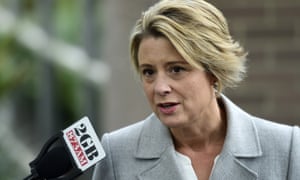Call by Kristina Keneally comes as cabinet agrees on its own inquiry
into the impact of law enforcement and intelligence powers on press
freedom
Labor will move to establish a parliamentary inquiry into press
freedom, accusing the government of “doing nothing” in the aftermath of
Australian federal police raids on two media organisations.
The shadow home affairs minister, Kristina Keneally, told the Senate on Tuesday afternoon that Labor would introduce a motion on Thursday to establish a parliamentary joint select committee into the public’s right to know and press freedom.
Keneally’s pre-emptive strike comes as Cabinet agreed on Monday to hold an inquiry into the impact of law enforcement and intelligence powers on the freedom of the press. Scott Morrison was due to discuss his proposal with the Labor leader Anthony Albanese at a meeting between the two leaders on Wednesday.
Cabinet resolved to refer the inquiry to the Parliamentary Joint Committee on Intelligence and Security. It said the PJCIS should examine the experiences of journalists and media organisations working in the beefed up security framework and whether the current laws require amendment.
Monday’s decision nominated two issues for specific inquiry – whether and in what circumstances there could be contested hearings in relation to warrants authorising investigative action in relation to journalists and media organisations; and the appropriateness of current thresholds for law enforcement and intelligence agencies to access electronic data on devices used by journalists and media organisations.
Keneally on Tuesday said Labor was pushing ahead with its own proposal in the “absence” of government leadership. The Coalition said last month it was preparing to act after widespread outrage at the police raids on the ABC and the home of News Limited journalist Annika Smethurst.
“In the absence of the Morrison government’s leadership, Labor wants
to ensure that parliament is getting the balance right between the
public’s right to know, the freedom of the press and Australia’s
national security,” Keneally said. “The events of the past month have
raised the question – is a free press a right Australians can continue
to rely on under the Morrison government?The shadow home affairs minister, Kristina Keneally, told the Senate on Tuesday afternoon that Labor would introduce a motion on Thursday to establish a parliamentary joint select committee into the public’s right to know and press freedom.
Keneally’s pre-emptive strike comes as Cabinet agreed on Monday to hold an inquiry into the impact of law enforcement and intelligence powers on the freedom of the press. Scott Morrison was due to discuss his proposal with the Labor leader Anthony Albanese at a meeting between the two leaders on Wednesday.
Cabinet resolved to refer the inquiry to the Parliamentary Joint Committee on Intelligence and Security. It said the PJCIS should examine the experiences of journalists and media organisations working in the beefed up security framework and whether the current laws require amendment.
Monday’s decision nominated two issues for specific inquiry – whether and in what circumstances there could be contested hearings in relation to warrants authorising investigative action in relation to journalists and media organisations; and the appropriateness of current thresholds for law enforcement and intelligence agencies to access electronic data on devices used by journalists and media organisations.
Keneally on Tuesday said Labor was pushing ahead with its own proposal in the “absence” of government leadership. The Coalition said last month it was preparing to act after widespread outrage at the police raids on the ABC and the home of News Limited journalist Annika Smethurst.
“There is a culture of secrecy and perverting the public’s right to know that has been making its way through this government for too long, and it’s time to call it out.”
The move comes after country’s three biggest media organisations – the ABC, News Corp and Nine – called on the government to amend a range of laws to protect journalists and whistleblowers after the raids.
Following the raids, the prime minister, Scott Morrison, and the communications minister, Paul Fletcher, left open the possibility of supporting an inquiry, and met with media executives, including the new chair of ABC, Ita Buttrose.
“If there is a suggestion, or evidence, or any analysis, that reveals that there is a need for further improvement of those laws, well the government is always open to that,” Morrison said on 11 June. “But it’s important that we honour both of those principles and I intend to proceed calmly, and soberly, and consultatively.”
Keneally said that while there was always “tension” in a democracy between balancing the secrecy required by national security with the right to a free press, the government should support the inquiry to ensure the balance was currently appropriate.
The proposed committee would include members from both the House and the Senate and provide an interim report by September, with a final report in November.
Its terms of reference would include specific reference to the disclosure and public reporting of sensitive and classified information, whistleblower protections, AFP leak referrals, the culture and leadership of government and the independence of the AFP.
“Scott Morrison and his government have failed to take their responsibilities seriously, to show leadership, and to take swift action to address the concerns of the Australian community and media organisations,” Keneally said.

No comments:
Post a Comment